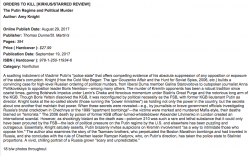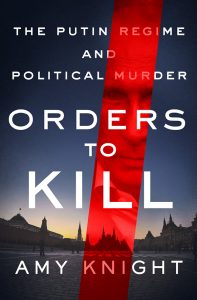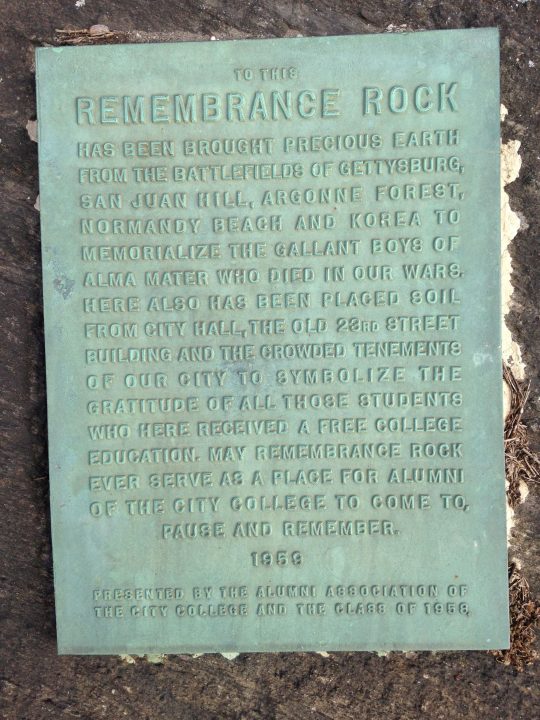About Philip Turner
My formative experience in the book business was running the chain of independent bookstores, Undercover Books, which I founded with my siblings and our parents in Cleveland, Ohio. During my seven years with the stores I served as a personal bookseller to thousands of readers and customers. Following bookselling, I’ve worked in publishing almost forty years. Through it all, I remain a bookselling-oriented editor, passionately devoted to helping authors connect with readers.
I am an editorial advocate for writer and reader. I edit with the author perched on one shoulder, the reader on the other, fostering a virtual dialogue between the two and creating mutual benefit for each. I am a hands-on line editor, of both brief and lengthy texts, with a generous feel for what a writer is trying to convey, and an intuitive sense of how to help them communicate their ideas as efficiently and memorably as possible. I welcome queries from new and experienced authors, predominantly in nonfiction, and some fiction, with fees quoted upon receipt and consideration of material.
Entries by
Sexual Harassment at Macmillan Publishing in 1989—A “Me Too” Account
October 15, 2017 /2 Comments/in Personal history, Family, Friends, Publishing & Bookselling /by Philip TurnerOctober 25 Update: In another day of revelations about sexual harassment, the New York Times‘ Jennifer Schuessler reports that the former literary editor of The New Republic Leon Wieseltier, who was about to launch a new magazine, is stepping down from that position in the wake of his admission that he harassed women at TNR. Publishers Lunch’s coverage (subscription required) of Wieseltier prompted the editors of the book industry website to add a link to my post below about harassment when I worked at Macmillan. Here’s a screenshot of Publishers Lunch’s item next to my original post. 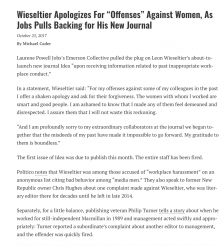
—
Earlier this week, on the day of #WomenBoycottTwitter, I began writing about an episode of sexual harassment that I was close to, then put it aside as it didn’t seem quite apt then. Tonight with the “Me too” theme rapidly spreading on Facebook, now seems the moment:
The Indomitable Alexey Navalny, Vladimir Putin’s Most Charismatic Critic
September 22, 2017 /1 Comment/in Books & Writing, News, Politics, History & Media, Philip Turner Book Productions, Publishing & Bookselling /by Philip Turner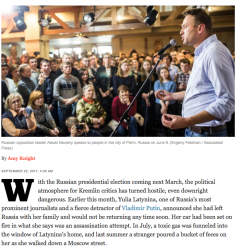 In case you haven’t seen this yet, it’s an important op-ed by my agency client Amy Knight’s in the LA Times today about Alexey Navalny, Vladimir Putin’s popular and charismatic critic. If you don’t know about him yet, you ought to because he’s got a chance to mount a credible challenge to Russia’s political status quo, and is making some headway despite an autocratic environment. The piece reports he has 80 campaign offices and more than 130,000 volunteers. Putin and his government are trying to sideline Navalny and scuttle his candidacy in next year’s presidential election by using the courts to keep him off the ballot. The piece is about 1000 words, so a 5-7 minute read and drawn from reporting for her book Orders to Kill: The Putin Regime & Political Murder. It went on sale this past Tuesday, from St Martin’s Press (ordering info here). I believe it is going to be very widely read and discussed. Thanks for sharing word about it if you have friends keeping any eye Russia’s ongoing politics, not just for what they’ve done in recent years and months, but for what is still to come. The book will help readers understand the Putin system, so necessary for us going forward since his displacement—by Navalny, or anything or anyone else—is unfortunately way more than a long shot. Note that with Russian law mandating 6-year presidential terms, if re-elected, Putin could be Russia’s leader till 2024, a worrying thought for the West. Still, if anyone could do it, Navalny is the one to watch most closely, for his canny maneuvering which includes a fed-up anti-corruption message that could stand alongside Trump’s failed promise to “drain the swamp.” In Russia, with the economy flat, and ordinary people falling behind, and businessmen and bankers cleaning up, Navalny rails against privileged plutocrats and means it. Navalny also bears watching because of the uncomfortable conclusion that his personal security could be at risk. Amy concludes her piece with a quote from the dissident:
In case you haven’t seen this yet, it’s an important op-ed by my agency client Amy Knight’s in the LA Times today about Alexey Navalny, Vladimir Putin’s popular and charismatic critic. If you don’t know about him yet, you ought to because he’s got a chance to mount a credible challenge to Russia’s political status quo, and is making some headway despite an autocratic environment. The piece reports he has 80 campaign offices and more than 130,000 volunteers. Putin and his government are trying to sideline Navalny and scuttle his candidacy in next year’s presidential election by using the courts to keep him off the ballot. The piece is about 1000 words, so a 5-7 minute read and drawn from reporting for her book Orders to Kill: The Putin Regime & Political Murder. It went on sale this past Tuesday, from St Martin’s Press (ordering info here). I believe it is going to be very widely read and discussed. Thanks for sharing word about it if you have friends keeping any eye Russia’s ongoing politics, not just for what they’ve done in recent years and months, but for what is still to come. The book will help readers understand the Putin system, so necessary for us going forward since his displacement—by Navalny, or anything or anyone else—is unfortunately way more than a long shot. Note that with Russian law mandating 6-year presidential terms, if re-elected, Putin could be Russia’s leader till 2024, a worrying thought for the West. Still, if anyone could do it, Navalny is the one to watch most closely, for his canny maneuvering which includes a fed-up anti-corruption message that could stand alongside Trump’s failed promise to “drain the swamp.” In Russia, with the economy flat, and ordinary people falling behind, and businessmen and bankers cleaning up, Navalny rails against privileged plutocrats and means it. Navalny also bears watching because of the uncomfortable conclusion that his personal security could be at risk. Amy concludes her piece with a quote from the dissident:
“In an interview with the BBC in January, Navalny, who is married with two children, was reminded of what happened to Nemtsov and asked if he realized the danger he faced. Navalny, whose political support far surpasses [the late Boris] Nemtsov’s popularity, assured his interviewer that he was fully aware of the risks of opposing Putin. As to his motivation, he added: ‘This is my country and I am going to fight for my country. I know that I am right.’”
South African Anti-Apartheid Activist Stephen Biko Died in Police Custody Forty Years Ago Today
September 12, 2017 /0 Comments/in Books & Writing, News, Politics, History & Media, Publishing & Bookselling /by Philip Turner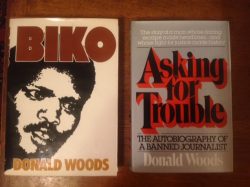 After Stephen Biko’s death following a brutal police interrogation in 1977, an atrocity that the South African government tried covering up, the anti-apartheid newspaper editor Donald Woods, who’d known Biko, quickly wrote and smuggled out of the country a manuscript* that was his combined biography of Biko and the Black Consciousness Movement (BCM) he’d been a key leader of, and an exposé on the case. The book added fuel to the controversy in Western countries about the conduct of the corrupt regime. It was an amazingly timely and powerful book, and instilled in me a love for ripped-from-the-headlines books, the sort that I’ve been partial to ever since. Biko was published in 1978 around the time my siblings and parents and I were getting ready to open our bookstore, Undercover Books, and it was among the first books I ordered for our opening stock. With the scandal that ensued from Biko’s death, ownership of Woods’s book became a crime in South Africa. I was very proud we sold many copies in Cleveland. Woods lived many years in Britain, and was still on the scene when Nelson Mandela finally became free.
After Stephen Biko’s death following a brutal police interrogation in 1977, an atrocity that the South African government tried covering up, the anti-apartheid newspaper editor Donald Woods, who’d known Biko, quickly wrote and smuggled out of the country a manuscript* that was his combined biography of Biko and the Black Consciousness Movement (BCM) he’d been a key leader of, and an exposé on the case. The book added fuel to the controversy in Western countries about the conduct of the corrupt regime. It was an amazingly timely and powerful book, and instilled in me a love for ripped-from-the-headlines books, the sort that I’ve been partial to ever since. Biko was published in 1978 around the time my siblings and parents and I were getting ready to open our bookstore, Undercover Books, and it was among the first books I ordered for our opening stock. With the scandal that ensued from Biko’s death, ownership of Woods’s book became a crime in South Africa. I was very proud we sold many copies in Cleveland. Woods lived many years in Britain, and was still on the scene when Nelson Mandela finally became free.
*When I said above that Donald Woods smuggled his manuscript for Biko out of South Africa, I could’ve added that he carried it out himself, in clandestine fashion, so it could be published in the West. He and his family fled the country in a land cruiser sort of vehicle, in back country, crossing a frontier to a neighboring country where there was no guard post. A brave man with nerves of steel—Woods was determined to honor the memory and sacrifice of a true human rights martyr by first writing the book, and then putting his life, and his family’s lives, on the line to make sure the manuscript would make it to publication. That’s commitment!
Strike Back at the Trump Administration’s Cruelty—Donate to Solar Cookers International!
September 12, 2017 /0 Comments/in News, Politics, History & Media /by Philip Turner Cooking with wood and other combustible fuels causes many health problems for children and adults in developing countries. As this story in Think Progress chronicles, going back to the George W. Bush administration, the US government has participated in and contributed to a UN program that provides clean cookstoves, either cookers that burn combustible fuels more cleanly by venting them adequately, or solar cookers as pictured here. However, the Trump administration recently pulled out of this clean cookstove program because it mentions climate change, and the very mention of that phrase is now forbidden by Trump officials. Learning about this, I got angry. But my anger quickly turned to inspiration, as I thought of the example of a friend, Jim Hanas, who’d recently done a fundraiser to mark his birthday. He inspired me to ask friends and contacts to help me mark my birthday on Sept 22 by donating to support the efforts of Solar Cookers International. Solar cookers, which cost less than $40, can help people live much more economically and healthfully. The campaign goal is $500 and fundraising on my Facebook page will continue through Sept 29. Please consider donating to this effort. No contribution is too small to help make a difference. Thanks a lot!
Cooking with wood and other combustible fuels causes many health problems for children and adults in developing countries. As this story in Think Progress chronicles, going back to the George W. Bush administration, the US government has participated in and contributed to a UN program that provides clean cookstoves, either cookers that burn combustible fuels more cleanly by venting them adequately, or solar cookers as pictured here. However, the Trump administration recently pulled out of this clean cookstove program because it mentions climate change, and the very mention of that phrase is now forbidden by Trump officials. Learning about this, I got angry. But my anger quickly turned to inspiration, as I thought of the example of a friend, Jim Hanas, who’d recently done a fundraiser to mark his birthday. He inspired me to ask friends and contacts to help me mark my birthday on Sept 22 by donating to support the efforts of Solar Cookers International. Solar cookers, which cost less than $40, can help people live much more economically and healthfully. The campaign goal is $500 and fundraising on my Facebook page will continue through Sept 29. Please consider donating to this effort. No contribution is too small to help make a difference. Thanks a lot! 

Publishers Weekly says Amy Knight’s ORDERS TO KILL is ‘A Vital Work for Understanding Modern-day Russia’
August 7, 2017 /1 Comment/in News, Politics, History & Media, Personal History, Family, Friends, Education, Travels, Philip Turner's Books & Writing /by Philip TurnerSeptember update: Kirkus gave a starred review to ORDERS TO KILL: The Putin Regime and Political Murder
Gratified by this first review of my literary agency client Amy Knight’s ORDERS TO KILL: The Putin Regime and Political Murder. Publishers Weekly says “This is a vital work for understanding modern-day Russia.” Linked to here at the PW site and in the screenshot below (r.).
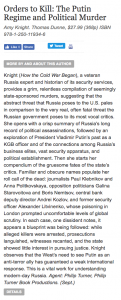
Last month I shared all the blurbs at an earlier post, including this one from Bill Browder: “Amy Knight’s [new book] builds a compelling case against the Putin regime for its complicity in the violent deaths of many of its critics—political opponents, muckraking journalists, and reform advocates. It also destroys the myth that we in the West can appease Putin to get him to behave himself.”—Bill Browder, author of Red Notice: A True Story of High Finance, Murder, and One Man’s Fight for Justice
Remembrance Rock, a Veritable Time Capsule at City College, Upper Manhattan
August 6, 2017 /0 Comments/in Bicycling, Urban Life & New York City /by Philip TurnerOn a recent bike ride I happened upon Remembrance Rock on the upper Manhattan campus of City College, commemorating students who died in American wars. A lugubrious history respectfully memorialized in public space. A sadly fitting homage, to bring soil from the places where service members died to this spot on the island New Yorkers call home, and mingle it with soil from historic places in the city. A kind of time capsule committed to the ground in 1959, , among the things I’d never known about my own city.
The full text of the Whitmanesque message can be read easily by clicking here:
#RemembranceRock


